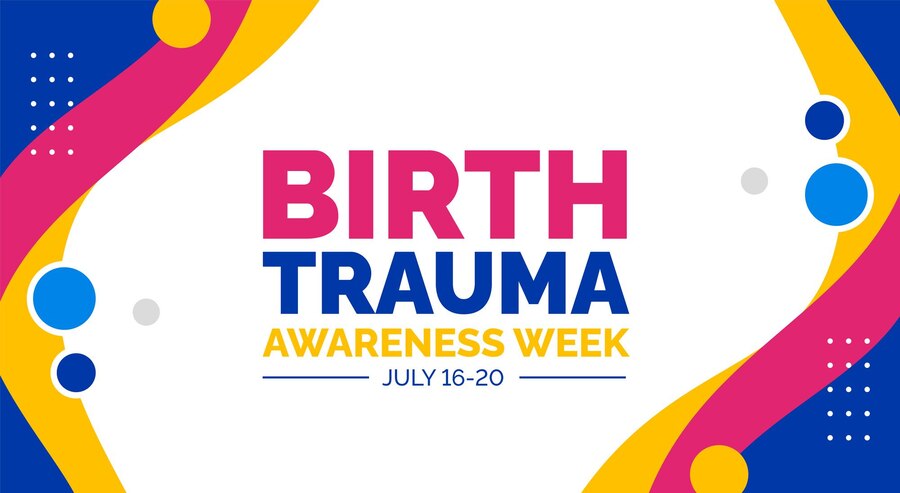Birth Trauma Awareness Week
Birth Trauma Awareness Week, which runs from the 7th to the 14th of July 2019, is a week dedicated to raising awareness of the potential risks of childbirth, sharing honest accounts from parents who have experienced trauma to guide others who are going through it now. Many people can feel isolated or afraid to talk about such an event, so this week has been introduced to put people at ease and offer the proper support and advice. Birth trauma is the experience of post-traumatic stress disorder (PTSD) after childbirth. It applies to any woman with PTSD symptoms after birth. You do not need a formal diagnosis of PTSD to suffer from birth trauma. There is a misconception that only soldiers experience PTSD. The reality is that it can occur after any traumatic event. PTSD can affect witnesses too. This means the partner of someone who has a traumatic childbirth might also experience birth trauma.
The Awareness Week has been set up by the Birth Trauma Association, a well-established charity that supports women who have experienced difficult births and advises parents on how to cope and overcome it. Birth trauma can be physical trauma in labor and delivery, as well as mental trauma. Women may experience physical and mental trauma together or separately.
WHAT CAUSES BIRTH TRAUMA?
Birth trauma is usually caused by the fear that either you or your baby will die. It can occur after any traumatic birth. However, some of the factors which make birth trauma more likely include: –
- Induction
- Poor pain relief
- Use of forceps
- Fear for your baby’s safety
- Stillbirth
- Birth of a baby with a disability resulting from a traumatic birth
- Birth of a baby who needs to stay in special care or intensive care
- Poor postnatal care
It is estimated that 1 in 3 people experience some kind of birth trauma with 30% experiencing some symptoms of PTSD, both of which are alarmingly high numbers. Partners who have witnessed a traumatic birth can also experience PTSD too. According to The Birth Trauma Association, there are four symptoms of PTSD:
- re-experiencing the trauma (e.g. flashbacks and nightmares);
- avoidance (the woman avoids any reminder of the trauma);
- negative cognitions and mood (such as feelings of guilt);
- arousal (such as hypervigilance). In effect, the brain is still in flight-or-fight mode, constantly alert to the threat of danger.
Those who have what appears to be a normal birth can suffer birth trauma if they feel out of control, not listened to, and suffer a loss of dignity, but mostly if they feel dismissed, unsupported, or are put under pressure to make decisions, particularly in the last few weeks of their pregnancy that they may subsequently regret.
WHAT ARE THE EFFECTS OF BIRTH TRAUMA?
Many people have trouble bonding with their babies after suffering from birth trauma. Unfortunately, their child can be a reminder of the trauma they have experienced, which can result in feelings of guilt.
Another common effect is worrying that something awful will happen to your baby. Some women may find it difficult to go back to the hospital where they gave birth, or even to walk past the building. Parents who lost their child might find it upsetting to meet family or friends with new babies and try to avoid this.
Women with birth trauma may find it difficult to undergo medical treatment which reminds them of the birth, such as smear tests, or to resume sexual relations. They might also want to avoid future pregnancies. This can put a significant strain on their relationships and family life.
Is birth trauma more likely to happen to some women or during certain types of birth?
We know that sexual assault victims are more susceptible to birth trauma because the experience of giving birth can re-awaken memories of the assault. That aside, most women who experience birth trauma have no particular background that predisposes them to the condition. It can happen to women of any age, ethnicity, or social class.
When it comes to the type of birth, we find that very long labors or very short intense ones are more likely to lead to birth trauma. We also frequently see women who have had an emergency cesarean birth, forceps birth, or a postpartum hemorrhage.
RAISING AWARENESS
Women affected by birth trauma often lack appropriate support. Many are wrongly diagnosed with postnatal depression or simply told that they need to try and move on with their life. Postnatal depression and birth trauma can overlap. However, they are not the same and need to be treated differently. A poor understanding of birth trauma can make sufferers feel lonely. Being told that they should just get over it can exacerbate feelings of guilt and isolation. Few people are aware that, without treatment, birth trauma can make it impossible to stop reliving the difficult birth experience.

